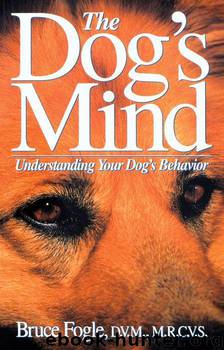The Dog's Mind: Understanding Your Dog's Behavior (Howell reference books) by Bruce Fogle

Author:Bruce Fogle [Unknown]
Language: eng
Format: epub
ISBN: 9781620457894
Publisher: Turner Publishing Company
Published: 1992-10-14T06:00:00+00:00
Chapter Seven
Later Learning – Our Influence on the Developing Mind
Although the patterns of his future behaviour are set in the dog's mind during the socialization period, it is over the next months that he learns the relevance of these behaviours and how to use them. His learning capacity is great and the speed with which he learns is considerable. Learning is fast because the blackboard, his mind, is still relatively uncluttered. The more he experiences life, however, the more difficult it becomes to instil new thoughts and ideas in his mind.
The greatest problem in understanding the dog's mind now occurs. It's our problem, not the dog's, for it is we who make the mistake of treating dogs as not quite as animal as other animals. The American psychiatrist Aaron Katcher described our quandary as lucidly as anyone when he wrote that pet owners look upon their pet dogs as 'four legged Peter Pans caught between nature and culture'. Dogs aren't caught between nature and culture. They might seem almost human to many of us but that's only because we recognize human attributes in their behaviour, fear, hunger, the desire to care for others and to be cared for in return. These aspects of their behaviour are all part of their culture and, although we recognize them, they might be displayed for slightly different reasons than those we have.
The unfortunate consequence is that many people genuinely do, during this formative period of the dog's life, treat him as a member of the family, democratically issuing conditional clauses to their pets when they misbehave. 'If you jump up on the dining room table once more Fido, I'll be really angry!' As hard as it might be to emotionally accept the fact, we must remember that the dog's thinking process, cognition, is not as complex as ours. Dogs don't think symbolically. To them fear is fear, sex is sex. What you see is what you get. The only exception to that is the occasional manifestation of psychosomatic illness, for example a feigned lameness to get attention, based on a previous real lameness that did evoke a sympathetic response. The cardinal fact to remember during this developmental stage of the dog's mind is that there are precise limitations to a dog's intelligence. Monkeys, for example, find detour tests in which they have to get around objects to get to some food very easy to overcome. Dogs find detour tests difficult.
The dog's mind has already been set on a certain course by his breeding, his genetic inheritance, by his mother's and his own hormonal influences and by his relationship with his mother, his littermates and with us. Early experience has set the tone for his future behaviour and he is now at a most active learning stage. Learning goes on constantly. Throughout his life there will be continuing gains and losses in knowledge but now is a time primarily of gains. The principles of learning apply surprisingly well to most mammals. A rat learning to
Download
This site does not store any files on its server. We only index and link to content provided by other sites. Please contact the content providers to delete copyright contents if any and email us, we'll remove relevant links or contents immediately.
The Secret History by Donna Tartt(19045)
Goodbye, Things by Fumio Sasaki(8575)
Wonder by R. J. Palacio(8097)
Turbulence by E. J. Noyes(8040)
How to Be a Bawse: A Guide to Conquering Life by Lilly Singh(7467)
The Thirst by Nesbo Jo(6929)
Kaplan MCAT General Chemistry Review by Kaplan(6926)
The Testaments by Margaret Atwood(6880)
The Last Wish (The Witcher Book 1) by Andrzej Sapkowski(5455)
Spare by Prince Harry The Duke of Sussex(5174)
The Body: A Guide for Occupants by Bill Bryson(5079)
The Rules Do Not Apply by Ariel Levy(4956)
On Writing A Memoir of the Craft by Stephen King(4928)
Audition by Ryu Murakami(4923)
The Doodle Revolution by Sunni Brown(4752)
Gerald's Game by Stephen King(4641)
Adulting by Kelly Williams Brown(4564)
Millionaire: The Philanderer, Gambler, and Duelist Who Invented Modern Finance by Janet Gleeson(4464)
Housekeeping by Marilynne Robinson(4436)
